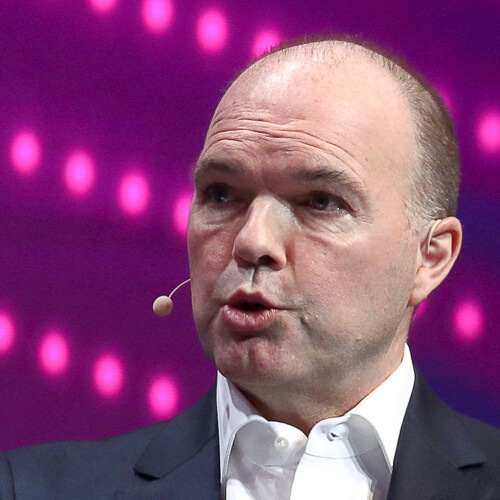
Vodafone CEO Nick Read seemed in a pretty good mood when fielding questions from analysts after presentation of the company's financial results for fiscal H1 (ended September 30).
"We're regaining commercial momentum across our European consumer business," he said, adding that the H1 showing "demonstrates the sustainable growth engine that we're building at Vodafone."
Markets like it, too
Vodafone's share price was up more than 6% on London's FTSE after the operator announced that the floor of FY22 EBITDA guidance was raised from €15 billion ($17 billion) to €15.2 billion ($17.2 billion) with the top end remaining at €15.4 billion ($17.5 billion).
Figure 1:  Halfway up the stairs: Nick Read has lamented what he sees as over competitive European markets while indicating (again) that time is right for consolidation, while commenting on H1 earnings.
Halfway up the stairs: Nick Read has lamented what he sees as over competitive European markets while indicating (again) that time is right for consolidation, while commenting on H1 earnings.
(Source: REUTERS / Alamy Stock Photo)
Moreover, Vodafone increased its full-year free cash flow target by €100 million (€114 million) to at least €5.3 billion (€6 billion).
H1 Group service revenue, at a shade over €19 billion ($21.6 billion), was a 2.8% increase compared to the same period for FY21. Adjusted core earnings rose by 6.5% to €7.6 billion ($8.6 billion). "Our results are in line with our expectations for the year and [our] medium-term financial ambition," enthused Read.
"Importantly," he continued, "return on capital [ROC] – which is very important to us – moved up 80 basis points to 6.3%."
ROC on the rocks?
Read caveated his ROC remarks, however, suggesting that national authorities and governments in Europe could do more to boost returns, which, in turn – an image of a carrot dangling in front of European Commission bigwigs might be appropriate here – will translate into more investment in critical national infrastructure.
"We need to accelerate return on capital to an acceptable level, and then inward investment will come into the sector," said Read. He ruefully pointed out that in each of the enormous markets of China, India and the US, there are three large-scale players.
"In some of our markets in southern Europe, we're five players plus… and this is why return on capital is so low," asserted Read. "What we need to do is consolidate going forward without punitive remedies."
The CEO seemed optimistic that competition watchdogs and governments were "getting it," however, and that the telecoms industry was generally more appreciated given the greater reliance on infrastructure during the pandemic.
Want to know more? Sign up to get our dedicated newsletters direct to
your inbox
"I think that there's a real understanding now of returns, and the importance of returns linked to investment, which is what [regulators] want from a policy perspective," ruminated Read. "I think there's more openness to engage on the topic of consolidation."
Read's self-styled "pragmatism" towards consolidation extended to Vantage Towers, Vodafone's European tower company spinout.
He did not rule out the possibility of an "industrial merger" with a "like-minded" partner – he mentioned the European tower businesses of Deutsche Telekom and Orange – but repeatedly emphasized that Vodafone was not keen on surrendering control in Vantage in the short- and medium-term in exchange for a smaller stake.
Related posts:
— Ken Wieland, contributing editor, special to Light Reading
Read more about:
EuropeAbout the Author(s)
You May Also Like











